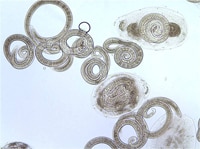
Trichinellosis

Trichinellosis, also called trichinosis, is a disease that people can get by eating raw or undercooked meat from animals infected with the microscopic parasite Trichinella.
Diagnosis

Bear muscle showing the encysted larvae at 200x magnification.
A diagnosis of trichinellosis is made in patients whose signs and symptoms are compatible with trichinellosis, have a positive laboratory test for Trichinella, and who can recall eating raw or undercooked pork or wild game meat.
Laboratory diagnosis of trichinellosis is most often made by a Trichinella antibody test. In some cases a muscle biopsy may be performed.
Treatment
Safe and effective prescription drugs are available to treat both trichinellosis and the symptoms that occur as a result of Trichinella infection. Treatment should begin as soon as possible; a doctor will make the decision to treat based upon symptoms, exposure to raw or undercooked meat, and laboratory test result
Disease

Sample of bear muscle tissue, digested. Image photographed at 100x magnification.
The first symptoms of trichinellosis are gastrointestinal, usually occurring 1–2 days after a person consumes raw or undercooked meat from a Trichinella-infected animal. These symptoms include the following:
- Nausea
- Diarrhea
- Vomiting
- Abdominal pain
The following classic symptoms of trichinellosis often occur within 2 weeks after eating contaminated meat, and can last up to 8 weeks:
- Muscle pain
- Fever
- Swelling of the face, particularly the eyes
- Weakness or fatigue
- Headache
- Chills
- Itchy skin or rash
- Cough
- Diarrhea
- Constipation
Symptoms may range from very mild to severe and relate to the number of infectious worms consumed in the meat. Many mild cases of trichinellosis are never specifically diagnosed because they are assumed to be the flu or other common illnesses. Furthermore, many people with trichinellosis do not experience any symptoms at all.
If the infection is heavy, persons may have trouble coordinating movements and have heart and breathing problems. Although rare, death can occur in severe cases. For mild to moderate infections, most symptoms go away within a few months.